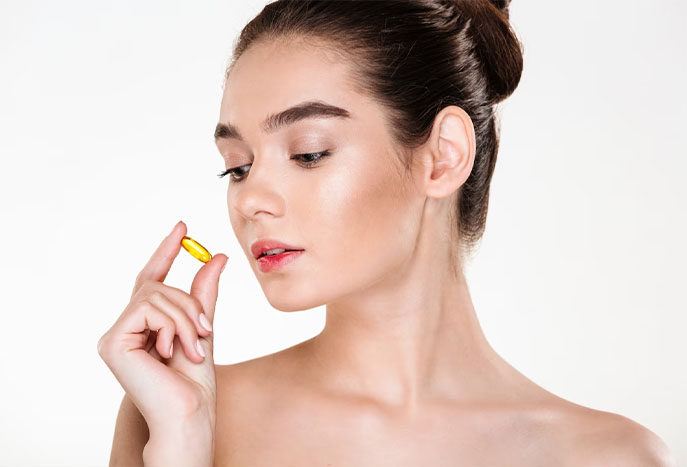
Living in a time where timeless beauty and radiant skin is an indication of validation, we often turn for help to beauty and cosmetics, using an arsenal of skincare products, cosmetics, and treatments. But what if we told you that there’s a missing piece to the beauty puzzle, one that comes not from a jar or tube, but from a bottle of supplements? Hence today’s article is named ‘Beauty in a bottle’. Supplements are used to provide the body with additional nutrition that might not be able to be gained otherwise, but as times evolve, beauty supplements are becoming more and more popular.
Before we discuss the impact that supplements have on beauty and cosmetic wellness, let us begin with the big question:
What is a supplement?
A supplement is a product, usually found in pill form, that is designed to provide additional nutrients such as vitamins and minerals. Supplements are typically intended to provide nutrients that might not be incurred through our daily diet.
Supplements can be chemical-based or natural, for example: vitamins and minerals may be synthesised and produced in a lab, while most herbal supplements are made through direct extractions from herbs and plants. In such cases, these materials may be extracted and purified, fermented, and compressed to meet necessary requirements. Supplements can come in various forms, such as tablets, capsules, soft gels, powders, or liquid extracts. Supplements should not be used as a replacement for a balanced diet, but rather used to play a complementary role in our health.
Next, let us address the issue at hand:
How do supplements affect beauty and cosmetic wellness?
Supplements can play a significant role in enhancing the health and appearance of your skin, hair, and nails, making you look and feel relatively younger and fitter. There are different types of vitamins and minerals used for different formulas of supplements, for example: collagen and vitamin C for safeguarding the skin; biotin, zinc and iron for hair protection and restoration; vitamin E, iron and calcium for protecting nails etc.
#1: Skin. In the modern world, Collagen supplements have become popular for making your skin radiant and healthy. Collagen is the most abundant protein in our skin, providing it with structure and strength. But as we age, our skin makes less collagen, which can cause wrinkles and saggy skin. Collagen supplements usually come from animals like cows or fish, and they have certain building blocks called amino acids, like proline and glycine, which are naturally used by human bodies to produce Collagen. Skin-supplements typically aid the natural collagen production in the body, causing our bodies to be less saggy and firmer and more nourished. Collagen supplements can also make your skin hold onto moisture, which can make it look smoother and plumper, and might even reduce fine lines and wrinkles.
#2: Hair. Vitamins play a crucial role in promoting hair health by providing the essential nutrients needed for hair growth, strength, and overall appearance. Among the key vitamins for gorgeous hair, vitamin A stands out as it supports the production of Sebum, which is an oily substance that moisturizes the scalp and keeps hair healthy. Additionally, vitamins C, E and D are also essential in follicle cycling and growth, as well as vitamin B types such as Biotin and Niacin, which helps with hair strength and thick texture. Biotin supplements are known for their ability to reduce hair brittleness and promote growth. Overall, hair supplements aid by providing a well-rounded approach to support gorgeous hair.
#3: Nails. Vitamins and minerals play a crucial role in promoting nail health by providing essential nutrients that contribute to the strength and appearance of nails. Some such essentials that are typically used in supplements that provide nail health are Vitamin B7, also known as Biotin (involved in the production of keratin, a protein that makes up nails, hair, and the outer layer of the skin), Vitamin E (an antioxidant that can help protect the nails from damage caused by free radicals, helps maintain moisture in nails), Vitamin C (essential for collagen production and acts as an antioxidant), Iron (helps with issues such as spoon-shaped nails and brittleness), Zinc (supports the production of Keratin), Folate also known as Vitamin B9 (plays a role in cell division and can contribute to the healthy growth of nails) and Calcium (helps with breakage and weakness of nails). Typically, practicing good nail care, such as avoiding excessive exposure to harsh chemicals and moisturizing the nails and cuticles regularly, goes hand in hand with supplements to promote strong and healthy nails.
When discussing beauty supplements, skincare products play a complementary role, each with their similarities and differences. Skincare products are applied topically and can provide immediate benefits to the skin’s surface, such as hydration, UV protection, and addressing specific skin concerns like acne or aging. On the other hand, beauty supplements work from within, supplying essential nutrients like vitamins, minerals, and antioxidants that support skin health at a cellular level. And while moisturizers and serums can hydrate the skin externally, beauty supplements can help lock in moisture by supporting the skin’s natural moisture barrier function. Ingredients such as hyaluronic acid is used in both supplements and skincare products. Furthermore, beauty supplements can address specific skin concerns, such as acne, by providing nutrients that support skin healing, which might not be the case with most skincare products.
Supplements claiming to have anti-aging properties often contain various vitamins, minerals, antioxidants, and other compounds that are believed to combat the signs of aging, including fine lines and wrinkles- and these types of supplements are widely marketed! Some typical nutrients that are scientifically backed to help with anti-aging are vitamins C and E, Selenium, Coenzyme Q10, Collagen and Hyaluronic acid. These antioxidants are believed to help neutralize harmful free radicals in the body, which can contribute to skin aging. In addition, other vitamins and minerals such as Resveratrol, Omega-3 fatty acids, and other vitamins A and D can also be seen in beauty supplements. It’s important to note that the effectiveness of these supplements in reducing fine lines and wrinkles can vary from person to person, and scientific evidence supporting their claims is often limited or inconclusive. In short- be aware of the risks of using these supplements long term and consult healthcare practitioners beforehand to ensure they are appropriate and risk-free for use.
The use of natural ingredients in supplements for promoting beauty and wellness has gained significant popularity over the years and these natural ingredients are often derived from plants, herbs, fruits, and other botanical sources. For example, Collagen can be extracted from marine plant sources, some supplements contain herbal extracts like green tea, ginseng, and ginkgo biloba, essential oils are extracted from plants such as rosehip, argan and evening primrose, and fruits and vegetables.
There are also vegan supplements- supplements which are specially formulated to fit the diet and preferable of people who follow and plant-based diet. Veganism excludes all animal-derived products, including meat, dairy, eggs, and even honey, and as such, some nutrients used in the production of vegan supplements are vitamin B12, vitamin D, Iron, Calcium, Omega-3 fatty acids extracted from flax seeds, chia seeds etc., Proteins such as peas, rice or hemp and iodine from salt. Depending on the person’s diet and specific needs, other vegan supplements may include iodine, selenium, vitamin K2, and choline. As with non-vegans, consulting a healthcare provider or registered dietitian can help determine individual nutritional needs, despite the supplements being vegan.
One of the most common rumours about supplements is that it causes cancer. Is this true?
In all fairness, the relationship between supplements and cancer risk is extremely complex and depends on various variables such as dosage, supplement used and the time period that the supplement is used. Research has suggested that certain high-dose supplements, such as beta-carotene, vitamin E, and folic acid, has increased the risk of cancer when taken in isolation or in excessive amounts. In short, some people may benefit from specific supplements to address deficiencies or health conditions, while others may not. The quality and safety of supplements can vary widely. Some supplements may be contaminated with harmful substances or not contain the ingredients they claim. Choosing reputable brands and consulting with healthcare professionals can help mitigate these risks. In short- the relationship between supplements and cancer is not a simple “yes” or “no” answer, as it depends on a lot of variables ranging from overall health situations to uncontrollable circumstances such as genetics and tumour growth.
In conclusion, while some supplements may provide benefits, it’s important to approach them with a discerning eye. The effectiveness of beauty supplements can vary among individuals, and they should be viewed as complementary to a balanced diet, proper skin care and overall health practices.




